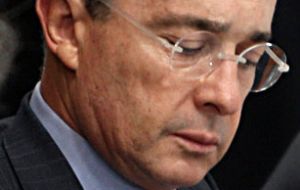MercoPress. South Atlantic News Agency
Colombian lawmakers pass Uribe re-election bill
 Mr Uribe is popular in Colombia for his campaign against leftist rebels
Mr Uribe is popular in Colombia for his campaign against leftist rebels Colombian lawmakers passed a bill on Tuesday aimed at allowing President Alvaro Uribe to seek a third consecutive term if the conservative U.S. ally chooses to run for re-election next May.
Uribe, popular for his U.S.-backed campaign against leftist rebels, has been evasive about whether he wants to run and he still faces hurdles to a possible re-election bid.
But he has high approval ratings and his allies drove the bill through the legislature despite opposition fears another term for Uribe would undermine Colombia's democracy.
Uribe's supporters say he is the only leader who can tackle the FARC guerrillas who once roamed the countryside kidnapping and bombing almost at will until he sent troops to reclaim swaths of the country under control of armed groups.
After a vote of 85 in favor of the proposal to five opposed, lawmakers applauded and hugged each other on the legislature floor. The bill calls for a referendum on amending the constitution to allow re-election and must still go before Colombia's constitutional court.
“The Congress has fulfilled its duty,” pro-Uribe lawmaker Santiago Castro said. “It's up to the Colombian people now to define the fate of the re-election at the polls.”
Investors praise Uribe's economic and security policies but are split over the risks a third term would entail for democratic institutions in Colombia, the world's No. 3 coffee exporter and a major South American oil producer.
Uribe's backers say a vote could be held earlier next year, but time is short as the court review could take three months, with two more months to organize the referendum.
Should he seek re-election, Uribe would follow his leftist Andean neighbors, Venezuelan President Hugo Chavez and Ecuador's Rafael Correa, who have both faced criticism for amending their constitutions to stay longer in office.
“What is in play here are the rules of the game of democracy,” said opposition lawmaker River Franklin Legro during a day of debate before the vote.
Second term hit by scandal
First elected in 2002, Uribe was a political outsider who came to power promising to smash Latin America's oldest left-wing guerrilla group and take on drug traffickers who have made Colombia the world's top cocaine producer
Aided by billions of dollars in U.S. funds, Uribe sent troops to drive the FARC back into the jungles and remote mountains, killing or capturing top commanders and thinning their ranks with desertions.
The popularity of his security and pro-investment policies allowed Uribe to change the constitution once before for his 2006 re-election and opinion polls show most Colombians would back him for a third term if he ran.
But a series of scandals has marred his second term in office and even some of his most ardent supporters now say eight years in power is enough.
Dozens of his lawmaker allies have been linked to paramilitary death squads and the DAS state security agency has been rocked by charges its agents spied on opponents, judges and journalists.
Democrats in the U.S. Congress reviewing Colombia's aid package and a free trade deal are also worried over the recent killings of civilians by soldiers trying to bump up their success rate in combat and by the Uribe government's sluggish progress in investigating the murder of labor unionists.
Political allies and opponents are already jockeying for position in case Uribe steps aside.
Former Defense Minister Juan Manuel Santos is closely linked to the success of Uribe's security campaign and is favored in some polls to replace him. But former Medellin Mayor Sergio Fajardo has gained ground as an independent. (Reuters)




Top Comments
Disclaimer & comment rulesCommenting for this story is now closed.
If you have a Facebook account, become a fan and comment on our Facebook Page!